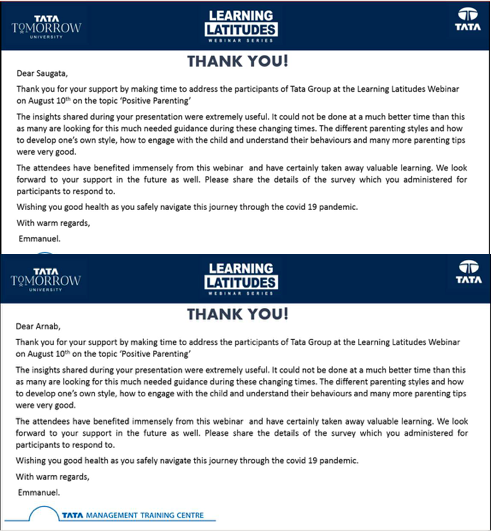Yancha for Schools
Child Development

Schools

About Yancha
- Yancha is a Positive Parenting and Child Development Organization
- We work with parents and help them raise their children well, thereby, empowering parents to transform their families
- And become more effective in workplace
- Yancha for Kids for child between 4 – 10 years (ready by May 2019)
- Yancha for Teens for young adults between 11 – 19 years (will be ready by March-April, 2020)
- Yancha is led by experts in the field of behaviour transformation and analytics.
- This comprehensive course enables parents to develop their child’s social, emotional, cognitive and physical abilities.
- Aligned to the realities of the modern world, and based on research on parenting, Yancha is a structured intervention to help couples carry out the complex process of parenting while evolving themselves in their lives biggest transformation.
At Yancha, We Believe That...
Teacher
- Every teacher is genuinely interested in the well being of their students
- Teachers want to participate in the holistic development of the child
- Teachers often get constrained due to paucity of time or strict adherence to syllabus
Parent
- Every parent is very sincere when it comes to the well-being of their child.
- Every parent wants the best for their child.
- And that every child is unique and definitely different from the parents.
Yancha @ Schools

Engagement with Schools
- Yancha can engage collaboratively with Schools, Students and Parents to develop the child
- School level analytics
- Program monitoring dashboard
- Structured Yancha G – Teacher – Parent interactions
- Yancha can engage with schools as a conduit to reach out to the parents
- Regular update on status of registrations
Parents Often
While bringing up their children parents often:- Rely on the way they were brought up
- Push their children into the rat race of school – tuition – best college
- Treat their children in a standard formula driven approach
- Compare their children with others
- Confuse their children with inconsistent messages about expectations from them
- Spend more time on phone, chats and TV, than with children
- Feel that purchasing goodies are sufficient to motivate a child
Effects of Improper Parenting
| Improper Parenting Approaches | Effects after years |
|---|---|
| Overly dominant parents | Low personal discipline |
| Protective parents | Poor self-confidence and self-esteem |
| Over-rewarding parents | Poor values and compassion |
| Over-parenting or No-parenting | Poor decision making ability |
Yancha Approach
- Twenty six sessions
- Structured behavioural approach of observe – understand – engage – evolve
- Interaction with Yancha Guides
Parents will be able to bring up their children up to their potential and:
- Bring up a child with positive discipline
- Develop confidence in the child
- Enable the child make decisions
- Develop the right values and compassion
Lessons for Life
| Be caring and gentle | When happy, think of the unfortunate always | Do something about it, use internet rightly | Take care of your health |
| Be disciplined and work hard | Happiness is in being together | Care is important, not mindless love | Do not carry a grudge |
| Replace fear with understanding, get over fear | Have no fear, if you are doing the right thing | Enjoy what you read | Have positive thoughts to overcome fear |
| Don't blindly follow others, use your judgment | Be creative, love nature and protect it | Spend money judiciously | Spread happiness among all |
| Believe in yourself, do not be stubborn | Do the right thing, what your heart tells you to do | Appreciate the differences | Celebrate every occasion |
| Do not seep biases into children, let them evolve | Give value to things money can't buy | Think before you act | Love and care for animals |
| Gain clarity, don't lose your mind | Do not discriminate |
Core Life Skills – National Board Curriculum
| Self-awareness | Problem Solving |
| Empathy | Effective communication |
| Critical thinking | Interpersonal relationship |
| Creative thinking | Coping with stress |
| Decision making | Coping with emotion |
Research Shows
- There are three major periods that you will go through to form your values and your personality according to the sociologist Morris Massey. The three major periods are the Imprint period, the Modelling period and the Socialisation period.
- The Imprint Period - From birth until the age of 7 you are like a sponge. You pick up and store everything that goes on in your environment. You get your basic programming between the ages of 2 and 4. By the time you are age 4 most of your major programming has occurred. During this time, you will unconsciously pick up on your parent’s behaviour.
- The Modelling Period - According to Massey, the ages 8 to 13 are the modelling period. Between this age, you begin to consciously and unconsciously model basic behaviours. At age 8 you begin to notice that there are people outside yourself and through to age 13 you start to look at the goings on in the world. You notice the behaviour of friends and family, and you start to model them
- Socialisation Period - This period occurs through the years 14 to 21. You go through a period where social interaction begins with other people. As a young adult, this is when you pick up relationships and social values, most of which will be used through the rest of your life.
How does Yancha Flow into your Life?

Session Flow – For One Session

Commercials
- INR 25,000 for a child for the 1 year program
- Sessions can be delivered by web-based platform or
- A mix of classroom session – large group – small group and individual; followed by web based interactions





